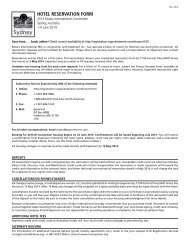Club Secretary's Manual - Rotary International
Club Secretary's Manual - Rotary International
Club Secretary's Manual - Rotary International
You also want an ePaper? Increase the reach of your titles
YUMPU automatically turns print PDFs into web optimized ePapers that Google loves.
CLUB<br />
SECRETARY’S<br />
MANUAL<br />
A pArt of the <strong>Club</strong> offiCers’ Kit<br />
229-EN—(512)
Introduction<br />
Contents<br />
1 Role and Responsibilities ..................................................................................................................................2<br />
Record Keeping ...........................................................................................................................................................................3<br />
Correspondence ...........................................................................................................................................................................5<br />
District Conference ..............................................................................................................................................................6<br />
RI Convention..................................................................................................................................................................................6<br />
Preparing Your Successor ........................................................................................................................................8<br />
Resources................................................................................................................................................................................................8<br />
2 Reporting Requirements ...............................................................................................................................11<br />
Semiannual Report .............................................................................................................................................................12<br />
Monthly Attendance Reports ..........................................................................................................................13<br />
Membership Changes....................................................................................................................................................15<br />
Visiting Rotarians Report ......................................................................................................................................15<br />
Rotarian Relocation Form .....................................................................................................................................15<br />
<strong>Club</strong> Information Changes ...................................................................................................................................16<br />
Official Directory Information ......................................................................................................................16<br />
Annual Report .............................................................................................................................................................................16<br />
3 Working with <strong>Club</strong> Leaders ....................................................................................................................17<br />
<strong>Club</strong> President ............................................................................................................................................................................17<br />
<strong>Club</strong> Treasurer ...........................................................................................................................................................................19<br />
<strong>Club</strong> Administration Committee ................................................................................................................20<br />
<strong>Club</strong> Membership Committee ........................................................................................................................21<br />
Appendixes ...........................................................................................................................................................................................................23<br />
District Assembly Worksheets ...........................................................................................................................26<br />
This is the 2012 edition of the <strong>Club</strong> Secretary’s <strong>Manual</strong> (229). It is intended for use by club<br />
secretaries holding office in 2013-14, 2014-15, and 2015-16. The information in this manual is based<br />
on the Standard <strong>Rotary</strong> <strong>Club</strong> Constitution, Recommended <strong>Rotary</strong> <strong>Club</strong> Bylaws, Constitution and<br />
Bylaws of <strong>Rotary</strong> <strong>International</strong>, <strong>Rotary</strong> Code of Policies, and The <strong>Rotary</strong> Foundation Code of<br />
Policies. Please refer to those resources for exact guidelines. Changes to those documents by the<br />
triennial Council on Legislation, the RI Board of Directors, or The <strong>Rotary</strong> Foundation Trustees<br />
override policy as stated in this publication.<br />
Photos: Alyce Henson and Monika Lozinska-Lee
Introduction<br />
The <strong>Club</strong> Secretary’s <strong>Manual</strong> was developed to support <strong>Rotary</strong> club<br />
secretaries worldwide. Because secretaries’ responsibilities vary<br />
according to regional practices and established club procedures, you<br />
should adapt the suggestions in this publication to fit your club’s needs.<br />
Use this manual to prepare for your term in office. Bring it to the<br />
district assembly, and review its contents beforehand. Pay particular<br />
attention to the questions in appendix 2, which will help you get the<br />
most out of the facilitated discussions at the meeting. After you have<br />
completed your training, this manual will serve as a resource during<br />
your year in office.<br />
Worksheets included in this manual are to be used at the district<br />
assembly. For responsibilities related to the club treasurer position,<br />
see the <strong>Club</strong> Treasurer’s <strong>Manual</strong> (220).<br />
Your <strong>Rotary</strong> club is a member of <strong>Rotary</strong> <strong>International</strong>. Through this<br />
membership, it is linked to the 34,000 <strong>Rotary</strong> clubs worldwide and<br />
granted access to the organization’s services and resources, including<br />
publications in nine languages, information at www.rotary.org,<br />
grants from The <strong>Rotary</strong> Foundation, and staff support at RI World<br />
Headquarters and the international offices.<br />
Comments?<br />
For questions about your role as club secretary, contact your assistant<br />
governor, past club secretary, or your <strong>Club</strong> and District Support<br />
representative. Submit questions or comments about this manual to:<br />
Leadership Education and Training Division<br />
<strong>Rotary</strong> <strong>International</strong><br />
One <strong>Rotary</strong> Center<br />
1560 Sherman Avenue<br />
Evanston, IL 60201-3698<br />
USA<br />
Email: learn@rotary.org<br />
Phone: +1-847-866-3000<br />
Fax: +1-847-866-9446<br />
<strong>Club</strong> SeCretary’S <strong>Manual</strong> 1 INTRODUCTION
1<br />
Role and<br />
Responsibilities<br />
On 1 July, you officially take office as club secretary. Your experience<br />
will depend on your club’s size and activity and your familiarity with<br />
<strong>Rotary</strong> and your new role. Your primary responsibility as secretary is<br />
to help the club function effectively.<br />
As secretary, you receive information from the club board,<br />
committees, and members; the district governor and your assistant<br />
governor; <strong>Rotary</strong> <strong>International</strong>; and The <strong>Rotary</strong> Foundation. It<br />
is important to monitor trends in club activities to help identify<br />
strengths and weaknesses, and to communicate this information to<br />
fellow club and district leaders for further action. To prepare for your<br />
role, consider these questions:<br />
• How does the secretary work with the president in your club?<br />
• How are club meetings planned?<br />
• What is the secretary’s role with the club website or newsletter?<br />
• What is the process for tracking attendance, and what do attendance<br />
reports indicate about member satisfaction?<br />
• What processes are in place for club archive maintenance,<br />
correspondence, and minutes?<br />
<strong>Club</strong> SeCretary’S <strong>Manual</strong> 2 ROLe AND RespONsIbILITIes
Begin to think critically about how this information can be used to<br />
benefit your club.<br />
If you are secretary of a <strong>Rotary</strong> e-club, this manual applies to you,<br />
except regarding club meetings. Please note the separate sections<br />
for each type of club in the Standard <strong>Rotary</strong> <strong>Club</strong> Constitution.<br />
For more information, see What You Need to Know about <strong>Rotary</strong><br />
E-<strong>Club</strong>s or contact your <strong>Club</strong> and District Support representative.<br />
Your responsibilities are summarized below and explained throughout<br />
the manual. As club secretary, you are responsible for<br />
• Maintaining membership records<br />
• Sending out notices of meetings of the club, board, and committees<br />
• Recording and maintaining minutes of club, board, and committee<br />
meetings<br />
• Making required reports to RI and your district<br />
• Recording attendance at meetings, and reporting monthly<br />
attendance figures to the district governor within 15 days of the last<br />
meeting of each month<br />
• Working with other club leaders<br />
• Performing any other duties that usually pertain to the office of<br />
secretary<br />
To further prepare for your role, attend the secretary training<br />
sessions at your district assembly, where you will meet incoming club<br />
presidents, secretaries, treasurers, and committee chairs from other<br />
clubs in the district, as well as district leaders. At this annual training<br />
meeting, club leaders discuss their roles, responsibilities, and goals<br />
for the coming year.<br />
Record Keeping<br />
The secretary is the custodian of all club records. At the beginning<br />
of the <strong>Rotary</strong> year, make arrangements with the outgoing secretary<br />
to receive the club files as well as office supplies and equipment.<br />
<strong>Club</strong> files should include the club charter, constitution, and bylaws;<br />
description of club locality; club history; minutes of all club and board<br />
of directors meetings; annual reports of club officers and committees;<br />
and a roster of club members. Work with the outgoing secretary to<br />
ensure that the records are complete. If the club doesn’t have a system<br />
for maintaining records, including attendance and payment of dues,<br />
get one started.<br />
Your club constitution and bylaws. The secretary often is asked about<br />
club policies and procedures. To answer those questions, you need to<br />
be thoroughly familiar with the constitution and bylaws of your club<br />
as well as those of <strong>Rotary</strong> <strong>International</strong>.<br />
<strong>Club</strong> SeCretary’S <strong>Manual</strong> 3 ROLe AND RespONsIbILITIes
At your first opportunity, review your club constitution to ensure that<br />
it is consistent with the current Standard <strong>Rotary</strong> <strong>Club</strong> Constitution,<br />
and review club bylaws to verify that they are current (use the<br />
Recommended <strong>Rotary</strong> <strong>Club</strong> Bylaws as a reference). The bylaws should<br />
reflect the operation of your club, including officer responsibilities<br />
and club committee structure, but must not contradict your club’s<br />
constitution or RI Constitution and Bylaws. Work with the club<br />
president to ensure that your constitution and bylaws are kept current.<br />
When legislation adopted by the Council on Legislation changes the<br />
Standard <strong>Rotary</strong> <strong>Club</strong> Constitution, those changes automatically<br />
become part of your club’s constitution. It is your responsibility to<br />
determine whether changes to the constitution require changes to the<br />
club’s bylaws.<br />
<strong>Club</strong> archive and library. The club archive contains historical<br />
information about the club and <strong>Rotary</strong>, including:<br />
• <strong>Club</strong>’s application for membership in RI and list of charter<br />
members<br />
• Documentation relating to change of club name or locality<br />
• <strong>Club</strong> constitution and bylaws with amendments<br />
• Meeting notices and minutes<br />
• District conference programs<br />
• Press clippings, photos, slides, and videos relating to the club and<br />
its projects and activities<br />
Maintain documentation of club activities during your term. At the<br />
end of the year, work with the president or a special committee (if<br />
one is appointed) to update the club archive, including a summary<br />
of activities for the year, photographs of officers and special events,<br />
names of new members, and outstanding accomplishments.<br />
A club library is useful for new- and continuing-member education.<br />
It should contain <strong>Rotary</strong> publications and audiovisual resources<br />
(obtained from shop.rotary.org), along with archived issues of the club<br />
newsletter, the governor’s monthly communication, The Rotarian or<br />
your <strong>Rotary</strong> regional magazine, and <strong>Rotary</strong> Leader.<br />
Member Access. The Member Access area of www.rotary.org enables<br />
Rotarians to perform <strong>Rotary</strong> business online, which facilitates<br />
administrative tasks and ensures that RI has accurate records. Only<br />
you and your club president can activate other officers’ Member<br />
Access privileges. Activation requires logging on to Member Access<br />
and indicating the officer’s position.<br />
The Member Access functionalities of club secretaries are shown on<br />
page 5.<br />
<strong>Club</strong> SeCretary’S <strong>Manual</strong> 4 ROLe AND RespONsIbILITIes
Use the RI Visual<br />
Identity Guide to<br />
ensure that the<br />
<strong>Rotary</strong> emblem<br />
is correctly<br />
reproduced on<br />
club stationery.<br />
The <strong>Rotary</strong><br />
emblem can be<br />
downloaded at<br />
www.rotary.org<br />
/graphics.<br />
<strong>Rotary</strong> <strong>International</strong> continues to enhance its services to Rotarians in its efforts to<br />
provide more online support.<br />
Correspondence<br />
In most <strong>Rotary</strong> clubs, the secretary responds to correspondence. Work<br />
with your club president to set up a process for responding to emails,<br />
letters, and faxes.<br />
Special notices. You are responsible for sending out special notices<br />
to club members, including notices of board meetings, important<br />
committee meetings, and membership notifications.<br />
Meetings of the board of directors. In most clubs, the secretary<br />
records the minutes of board meetings and prepares a summary<br />
for members. You can deliver this summary during a club meeting,<br />
through the club newsletter, or on the club website. Promptly notify<br />
club committee chairs of any board action related to their committees.<br />
File a copy of the minutes in the club’s archives.<br />
Informing the district governor and RI. Inform the district governor<br />
and RI of special club activities and plans. The governor can share this<br />
information with other clubs through the monthly communication, the<br />
district website, or assistant governors, and RI may share it with the<br />
<strong>Rotary</strong> world through its publications or www.rotary.org.<br />
<strong>Club</strong> SeCretary’S <strong>Manual</strong> 5 Role and Responsibilities
Use the<br />
promotional<br />
materials you<br />
receive from<br />
the district<br />
conference<br />
committee<br />
to promote<br />
attendance by<br />
club members.<br />
Beware of emails using <strong>Rotary</strong> terminology that ask for passport<br />
or other personal information. They are usually fraudulent and<br />
should be disregarded. Before providing any personal information,<br />
confirm the sender’s identity and the reason for the request via<br />
separate email or phone call.<br />
District Conference<br />
Like the club president, you should attend the district conference,<br />
which is intended to promote <strong>Rotary</strong> programs through fellowship,<br />
inspirational addresses, and discussion.<br />
The conference also often serves as a district legislative body, and as<br />
an opportunity to discuss special topics suggested by the RI Board<br />
of Directors. Also, a representative is elected to the Council on<br />
Legislation, which meets every three years.<br />
<strong>Club</strong> electors. Work with the president on the club’s selection of<br />
electors to attend the district conference. Each club is entitled to one<br />
elector for every 25 members or major fraction thereof (not including<br />
honorary members), based on the club’s membership records as of<br />
the most recent semiannual payment preceding the voting date. Each<br />
club is entitled to at least one elector, and electors must be active club<br />
members. Only active clubs can vote at the district conference.<br />
A club may designate a proxy for any absent electors with permission<br />
of the governor.<br />
Credentials certificates. The credentials certificate shows that the<br />
elector is qualified to vote on behalf of the club. The club secretary<br />
should follow these steps for each elector:<br />
1. Complete the credentials certificate. Forms are provided by the<br />
district governor (if your club doesn’t receive one, prepare your<br />
own).<br />
− Fill in the elector’s name.<br />
− Insert the club’s membership total and the number of electors to<br />
which the club is entitled.<br />
− Sign the certificate, and have it signed by the club president.<br />
2. Deliver the original certificate to the elector, who will present it to<br />
the credentials committee at the beginning of the conference.<br />
3. File a duplicate copy in the club files.<br />
RI Convention<br />
The RI Convention is the annual meeting during which RI business is<br />
conducted and its officers are officially elected. Each club should send<br />
at least one delegate to represent the club in all business decisions<br />
made at the convention. Work with the club president to select a<br />
delegate.<br />
<strong>Club</strong> SeCretary’S <strong>Manual</strong> 6 ROLe AND RespONsIbILITIes
RI World<br />
Headquarters<br />
sends the<br />
appropriate<br />
number of<br />
credentials<br />
certificates<br />
to each club.<br />
Do not submit<br />
completed<br />
credentials<br />
certificates to RI.<br />
You should follow these steps to ensure that delegates are selected<br />
appropriately:<br />
1. Elect delegates<br />
Each club must elect at least one delegate, regardless of whether<br />
anyone else from the club plans to attend the convention. A delegate<br />
must be an active member of the club. Each club is entitled to<br />
one delegate for every 50 members or major fraction thereof (not<br />
including honorary members), according to the club’s membership<br />
records as of 31 December preceding the convention.<br />
If a club is entitled to two or more delegates, it may authorize<br />
one to cast all of the club’s votes. Authorization is indicated by<br />
giving the delegate a credentials certificate (which includes the<br />
voting delegate’s card) for each vote the delegate is authorized to<br />
cast. A delegate authorized to cast two votes should be given two<br />
credentials certificates, one authorized to cast three votes should be<br />
given three credentials certificates, and so on.<br />
2. Select alternates<br />
Alternates can be elected to substitute for delegates who are unable<br />
to serve. Only Rotarians who plan to attend the convention should<br />
be appointed as alternates.<br />
When electing its delegate(s), a club may choose an alternate for<br />
each, and, in the event this alternate is unavailable to serve, a<br />
second alternate. Alternates (and second alternates) are entitled to<br />
vote only if the delegates they were chosen to replace are absent.<br />
3. Designate proxies<br />
A club not represented at the convention by a delegate or an<br />
alternate may designate a proxy to cast one or more of the votes<br />
to which it is entitled. The proxy must be an active member of any<br />
club within the same district.<br />
For more information on qualifying delegates, alternates, and proxies,<br />
see the <strong>Manual</strong> of Procedure (035).<br />
Credentials certificates. You should follow the steps below to ensure<br />
that your club’s credentials certificates are handled appropriately. For<br />
each delegate, your club must<br />
1. Complete the credentials certificate including:<br />
− Number of club members as of 31 December preceding the<br />
convention (not including honorary members)<br />
− Number of delegates to which club is entitled<br />
− Date on which delegate (and the alternate or proxy) was selected<br />
− Name of delegate<br />
− Name of alternate, if selected<br />
− Name of proxy, if designated, and proxy’s <strong>Rotary</strong> club name and<br />
district number<br />
<strong>Club</strong> SeCretary’S <strong>Manual</strong> 7 ROLe AND RespONsIbILITIes
2. Give the credentials certificate to the Rotarian who will attend<br />
the convention as the club’s delegate or proxy with instructions<br />
to present the certificate(s) to the credentials committee at the<br />
convention’s voting delegates booth.<br />
3. File a copy of the certificate in the club files.<br />
If you do not have the credentials certificate from RI, prepare a<br />
letter naming the delegate(s) and stating the number of active club<br />
members as of the preceding 31 December. Two officers (preferably<br />
the president and secretary) should sign the letter.<br />
preparing Your successor<br />
Meet with your successor so that he or she will be prepared to assume<br />
office on 1 July and, in particular, to complete the July semiannual<br />
report. Review all administrative procedures and the organization of<br />
club files. After the last club meeting in June, turn over all files and<br />
equipment to your successor.<br />
Before your term ends, you should make sure that club records are<br />
current and materials are orderly. Ask yourself the following to get<br />
started:<br />
• Are all of the club’s records on attendance, membership, board<br />
meetings, payment of club dues, and contributions to The <strong>Rotary</strong><br />
Foundation in order?<br />
• Is the file containing the club’s constitutional documents, charter,<br />
and locality description complete and in order?<br />
• Is there a copy of all necessary reports in the appropriate club files?<br />
• Is club equipment (bell, gavel, meeting badges, banner) in good<br />
condition? What needs to be ordered?<br />
Resources<br />
Contact information for RI and Foundation officers, appointees,<br />
and staff is listed in the Official Directory and at www.rotary.org.<br />
Download publications at www.rotary.org, or order them through<br />
shop.rotary.org or your international office.<br />
The following resources are available to help you fulfill your<br />
responsibilities:<br />
Online Resources (www.rotary.org)<br />
• Member Access — Members-only section of the <strong>Rotary</strong> website that<br />
enables Rotarians to contribute to The <strong>Rotary</strong> Foundation, manage<br />
e-newsletter subscriptions, register for the RI Convention, and<br />
access member benefits. <strong>Club</strong> officers can also obtain reports and<br />
records.<br />
<strong>Club</strong> SeCretary’S <strong>Manual</strong> 8 ROLe AND RespONsIbILITIes
• <strong>Rotary</strong> Code of Policies and <strong>Rotary</strong> Foundation Code of Policies —<br />
Policies and procedures established by the RI Board of Directors<br />
and The <strong>Rotary</strong> Foundation Board of Trustees in support of the RI<br />
Constitution and Bylaws; revised following each Board or Trustees<br />
meeting.<br />
• www.rotary.org — Information for club leaders about effective club<br />
operations, including links to club administration, membership,<br />
public relations, service projects, and The <strong>Rotary</strong> Foundation, and<br />
club-level resource pages.<br />
• <strong>Club</strong> Locator — Search tool for finding <strong>Rotary</strong> clubs by name, city/<br />
town, or district number.<br />
Informational Resources<br />
• District directory or website — Includes meeting information<br />
for clubs in the district and contact information for the governor,<br />
governor-elect, assistant governors, district committees, club<br />
officers, and other <strong>Rotary</strong> leaders.<br />
• How to Propose a New Member (254) — Brochure outlining<br />
the procedure for selecting and electing members. Includes a<br />
Membership Proposal Form.<br />
• <strong>Manual</strong> of Procedure (035) — RI and Foundation policies and<br />
procedures, including RI constitutional documents, the RI Board of<br />
Directors, and the Trustees of The <strong>Rotary</strong> Foundation. Issued every<br />
three years after the Council on Legislation.<br />
• Official Directory (007) — Contact information for RI and<br />
Foundation officers, committees, resource groups, and Secretariat<br />
staff; worldwide listing of districts and governors; alphabetical<br />
listing of clubs within districts, including contact information.<br />
Issued annually. Note: Rotarians, <strong>Rotary</strong> clubs, and districts<br />
are prohibited from making the Official Directory available as a<br />
commercial mailing list.<br />
• Shop.rotary.org — <strong>Rotary</strong>’s online store for ordering RI<br />
publications, DVDs, forms, and supplies. Print catalog (019) also<br />
available.<br />
• <strong>Rotary</strong> Leader — E-newsletter for <strong>Rotary</strong> leaders that can be<br />
used as a source for club newsletters and websites. Subscribe at<br />
www.rotary.org/newsletters.<br />
• The Rotarian — RI’s official magazine, published monthly. (<strong>Club</strong>s<br />
that don’t subscribe to The Rotarian subscribe to one of more<br />
than 30 regional magazines that are published in more than 20<br />
languages.)<br />
<strong>Club</strong> SeCretary’S <strong>Manual</strong> 9 ROLe AND RespONsIbILITIes
The club<br />
secretary<br />
should help<br />
the president<br />
prepare for and<br />
follow up on<br />
the assistant<br />
governor’s visits.<br />
Human Resources<br />
• Assistant governor — Rotarian appointed to assist the governor<br />
with the administration of designated clubs. Your assistant governor<br />
will visit your club quarterly and is available to assist your club<br />
throughout the year. (Contact information is available from your<br />
district.)<br />
• Contact Center — A team available to answer questions; can be<br />
reached at contact.center@rotary.org or toll-free (within USA and<br />
Canada) at 866-9-ROTARY (866-976-8279). Rotarians outside North<br />
America should continue to contact their international office.<br />
• Past club secretaries — Rotarians who know your club procedures<br />
and history.<br />
• RI <strong>Club</strong> and District Support representative (www.rotary.org/cds) —<br />
Staff members at international offices and RI World Headquarters<br />
who can answer many administrative questions and direct other<br />
inquiries to appropriate RI and Foundation staff.<br />
<strong>Club</strong> SeCretary’S <strong>Manual</strong> 10 ROLe AND RespONsIbILITIes
2<br />
Reporting<br />
Requirements<br />
An essential part of the club secretary’s work is to prepare and submit<br />
these required reports:<br />
Report submit to Due date<br />
Semiannual report RI, with a copy of the<br />
worksheet sent to the district<br />
governor<br />
1 July and 1 January<br />
Monthly attendance report of District governor Within 15 days following the<br />
club meetings<br />
last meeting of the month<br />
Changes in membership RI and district governor Ongoing<br />
Visiting Rotarians attendance<br />
reports<br />
<strong>Rotary</strong> club of visitor Ongoing<br />
Rotarian Relocation Form <strong>Rotary</strong> club in new<br />
community<br />
Ongoing<br />
<strong>Club</strong> information changes RI and district governor Ongoing<br />
Official Directory information RI and district governor 31 December<br />
<strong>Club</strong> SeCretary’S <strong>Manual</strong> 11 RepORTINg ReqUIRemeNTs
Semiannual<br />
reports, changes<br />
in membership,<br />
club information<br />
changes, and<br />
Official Directory<br />
information can<br />
be submitted<br />
to RI through<br />
Member<br />
Access at<br />
www.rotary.org.<br />
For more<br />
information on<br />
the dues and fees<br />
collected from<br />
club members,<br />
refer to the<br />
<strong>Club</strong> Treasurer’s<br />
<strong>Manual</strong>.<br />
<strong>Club</strong>s that<br />
don’t pay their<br />
dues and fees<br />
to RI will be<br />
terminated and<br />
will not receive<br />
services from RI<br />
or their district.<br />
semiannual Report<br />
RI sends a semiannual report (SAR) packet to each <strong>Rotary</strong> club<br />
secretary in late June for the July billing and in late December for the<br />
January billing. The packet consists of two parts:<br />
• <strong>Club</strong> membership list, per RI records, which serves as the basis for<br />
the estimated billing.<br />
• Invoice for RI per capita and prorated dues, Council on Legislation<br />
fees, and magazine subscriptions. (Note that two Rotarians residing<br />
at the same address have the option of subscribing jointly to the<br />
official magazine.) The treasurer is responsible for this portion and<br />
should recalculate what is owed using the SAR worksheet provided<br />
in the packet.<br />
Keep your club membership list current through Member Access so<br />
that the per capita billing is accurate. Your club’s balance may be paid<br />
by credit card through Member Access by you, the treasurer, or the<br />
president. <strong>Club</strong>s with fewer than 10 members are required to pay for<br />
10 members.<br />
If you do not receive the SAR packet by the end of July or January,<br />
you can print a copy from Member Access or request it by contacting<br />
data@rotary.org or your international office.<br />
Submitting dues to the district and RI guarantees your club’s<br />
membership and good financial standing in <strong>Rotary</strong> <strong>International</strong>, as<br />
well as access to the organization’s resources.<br />
<strong>Club</strong>s accepting a transferring or former Rotarian must first<br />
secure a certificate from the former club confirming that person’s<br />
membership, as well as verification that the member does not owe<br />
any debts to the club. A prospective member cannot join a new<br />
club until all debts to the former club have been paid.<br />
Termination and Reinstatement<br />
Any club that does not pay its dues and fees to RI will be terminated<br />
and will not receive services from RI or the district. The club’s<br />
membership can also be suspended or terminated if any member of<br />
the club has misused funds from The <strong>Rotary</strong> Foundation.<br />
Termination<br />
• Six months after the 1 January or 1 July deadline, clubs with unpaid<br />
per capita RI dues over US$250 will be terminated.<br />
• <strong>Club</strong>s that have not fulfilled their entire financial responsibility<br />
within 365 days of termination will lose their original charter and<br />
will not be eligible for reinstatement.<br />
Reinstatement<br />
• Within 90 days of termination, the club must pay all financial<br />
obligations to RI, including a $10-per-member reinstatement fee.<br />
<strong>Club</strong>s with fewer than 10 members must pay for a minimum of<br />
10 members.<br />
<strong>Club</strong> SeCretary’S <strong>Manual</strong> 12 RepORTINg ReqUIRemeNTs
• More than 90 days but less than 365 days after termination, the club<br />
must pay all financial obligations to RI, pay a 10-member minimum<br />
reinstatement fee, complete a reinstatement application, and pay an<br />
additional $15-per-member application fee, which is also subject to<br />
the minimum 10-member requirement.<br />
Member termination<br />
The club secretary should notify any member who fails to pay dues<br />
within 30 days after the deadline. The notification should specify the<br />
amount owed and the deadline. If the dues are not paid within 10 days<br />
of the notification date, membership may be terminated, subject to the<br />
discretion of the club’s board. The board may reinstate membership<br />
upon a member’s petition and payment of all debts to the club.<br />
monthly Attendance Reports<br />
One of the main responsibilities of the club secretary is taking and<br />
calculating attendance and reporting the calculation monthly to the<br />
district governor. Attendance policy is explained below and in the<br />
Standard <strong>Rotary</strong> <strong>Club</strong> Constitution. You may want to ask your club<br />
administration committee to assist you by<br />
• Educating club members about the attendance requirement<br />
• Informing club members about how to make up a missed meeting,<br />
including participating in a <strong>Rotary</strong> e-club meeting<br />
• Tracking attendance<br />
Attendance. Meeting attendance is calculated by taking the number of<br />
active members present and dividing it by the total number of active<br />
members in your club. If your club has members who are excused<br />
under sections 3b and 4 of Article 9 of the Standard <strong>Rotary</strong> <strong>Club</strong><br />
Constitution or because of a district officer position, count them as<br />
present if they attend a club meeting, but do not count them as absent<br />
if they do not attend.<br />
Active members credited with attendance. When taking attendance<br />
at club meetings, there are specific ways to account for active and<br />
inactive members. Do include active club members, members credited<br />
with make-ups, and members excused by the board. Do not include<br />
members whose combined age and years of membership (in one or<br />
more clubs) is 65 or more, and who have received board approval after<br />
notifying the club secretary in writing of their desire to be excused<br />
from attendance.<br />
Do not include current RI officers or visitors.<br />
Make-ups. Excused absences cannot be longer than 12 months. You<br />
may give attendance credit to a member who misses a club meeting if,<br />
within 14 days before or after the missed meeting, the member meets<br />
one of the following conditions:<br />
• Attends at least 60 percent of the regular meeting of another <strong>Rotary</strong><br />
club or a provisional <strong>Rotary</strong> club, or is present at the usual time and<br />
place of another club’s regular meeting and that club is not meeting<br />
<strong>Club</strong> SeCretary’S <strong>Manual</strong> 13 RepORTINg ReqUIRemeNTs
• Attends or travels with reasonable directness to or from any of the<br />
following:<br />
− RI Convention<br />
− District conference<br />
− Council on Legislation − District assembly<br />
− <strong>International</strong> Assembly − Any district committee<br />
− <strong>Rotary</strong> institute<br />
meeting held by<br />
direction of district<br />
− RI committee meeting<br />
governor or RI Board<br />
− Any meeting held by of Directors<br />
direction/approval of<br />
− Regularly announced<br />
RI Board of Directors<br />
intercity meeting of<br />
− Multizone conference <strong>Rotary</strong> clubs<br />
• Attends and participates in a club service project or club-sponsored<br />
community event or meeting authorized by the board<br />
• Participates directly and actively in a service project sponsored by<br />
the district, RI, or The <strong>Rotary</strong> Foundation in a remote area where a<br />
make-up opportunity isn’t available<br />
• Attends a regular meeting of any of the following: Rotaract<br />
club, Interact club, <strong>Rotary</strong> Community Corps, a <strong>Rotary</strong> e-club, a<br />
provisional Rotaract or Interact club or <strong>Rotary</strong> Community Corps,<br />
or a meeting of a <strong>Rotary</strong> Fellowship<br />
• Attends a board meeting or, if authorized by the board, a meeting of<br />
a service committee to which the member is assigned<br />
• Participates through a club website in an interactive activity<br />
requiring an average of 30 minutes of participation<br />
• Is serving on <strong>Rotary</strong> business as an RI committee officer or<br />
member, a <strong>Rotary</strong> Foundation trustee, or district governor’s special<br />
representative for the formation of a new club, or is conducting<br />
<strong>Rotary</strong> business as a <strong>Rotary</strong> <strong>International</strong> employee<br />
Monthly attendance report to district governor. Every month, the<br />
secretary is responsible for sending the district governor a report of<br />
the club’s monthly attendance, as described above. This report should<br />
be sent within 15 days of the last meeting of each month.<br />
Canceled meetings. When calculating the club’s monthly attendance<br />
report, omit any regular club meeting that is canceled for one of the<br />
following reasons:<br />
• Legal holiday, or a commonly recognized holiday<br />
• Death of a club member<br />
• Epidemic or disaster affecting the entire community<br />
• Armed conflict in the community that endangers the lives of club<br />
members<br />
Additionally, the board may cancel up to four meetings per <strong>Rotary</strong><br />
year for causes not otherwise specified, as long as the club does not<br />
cancel more than three consecutive meetings. Do not include these<br />
canceled meetings when calculating attendance.<br />
<strong>Club</strong> SeCretary’S <strong>Manual</strong> 14 RepORTINg ReqUIRemeNTs
membership Changes<br />
During the year, most clubs experience membership changes,<br />
including new members, changes in members’ contact information,<br />
and membership terminations. Report all changes to RI through<br />
Member Access as soon as they become effective. Be sure to notify<br />
your district governor and update club records. By submitting newmember<br />
information, the club secretary ensures that the member’s<br />
name is entered in the club membership record and that his or her<br />
subscription to The Rotarian or <strong>Rotary</strong> regional magazine is activated.<br />
If the new member is a former Rotarian, be sure to provide the<br />
name of the member’s previous <strong>Rotary</strong> club and member ID number<br />
(if available) so that the member’s history, including records of<br />
Foundation giving and RI offices held, is retained.<br />
<strong>Club</strong>s accepting a transferring or former Rotarian must first secure a<br />
certificate from the former club confirming that person’s membership,<br />
as well as verification that the former member does not owe any debts<br />
to the club. A prospective member cannot join a new club until all<br />
debts to the former club have been paid.<br />
Reporting changes through Member Access. Membership changes<br />
reported through Member Access are made directly to the RI database<br />
and processed immediately. Be aware that if you terminate a member,<br />
the change to the individual’s membership status is immediate and<br />
permanent. Members can update their own contact information.<br />
The Membership Data Form can be completed at www.rotary.org<br />
and submitted through Member Access, or download the form and<br />
email it to data@rotary.org. Save copies for your district governor<br />
and for your club files.<br />
Visiting Rotarians Report<br />
Provide visiting Rotarians with documentation of their attendance<br />
at your club meeting so their club will credit them with the make-up.<br />
This documentation could be a card given to the visitor or an email<br />
sent to the secretary of the visitor’s club.<br />
Rotarian Relocation Form<br />
Rotarians who leave your club because they are moving may be<br />
eligible for membership in a <strong>Rotary</strong> club in their new community.<br />
Your club can propose a relocating Rotarian for club membership<br />
elsewhere (as can a member of the local club). Use the Rotarian<br />
Relocation Form to notify the other club’s president or secretary about<br />
the prospective member.<br />
<strong>Club</strong> SeCretary’S <strong>Manual</strong> 15 RepORTINg ReqUIRemeNTs
<strong>Club</strong> Information Changes<br />
Any change of club information (for example, a new meeting time,<br />
place, or day; a new president or secretary; a change of address for<br />
a president or secretary) should be reported immediately to your<br />
district governor and RI through Member Access or by e-mailing<br />
data@rotary.org.<br />
Official Directory Information<br />
Submit your club’s data for the Official Directory through Member<br />
Access. If you do not have Internet access, send a letter containing the<br />
following information to RI World Headquarters or the international<br />
office serving your area: club name, district, and meeting place and<br />
day; names of the club president and secretary and their mail and<br />
email addresses and phone numbers. Also note whether your club<br />
prefers to receive the Official Directory on CD or online (through<br />
Member Access). Share this information with the district governorelect<br />
so that he or she can contact incoming club presidents and the<br />
current governor. Retain a copy for your records.<br />
Annual Report<br />
Near the end of your year as secretary, you should prepare an annual<br />
report for presentation at the final club meeting of the year. Confer<br />
with the club president to ensure that you will not duplicate his or<br />
her report. The annual report should include brief statements about<br />
actions taken by the club’s board of directors, membership gain or loss<br />
for the year, and any continuing projects that are not covered in the<br />
president’s report.<br />
<strong>Club</strong> SeCretary’S <strong>Manual</strong> 16 RepORTINg ReqUIRemeNTs
3<br />
Working with<br />
<strong>Club</strong> Leaders<br />
An important part of a leadership role is developing relationships with<br />
fellow club leaders and members.<br />
<strong>Club</strong> president<br />
The secretary and the president must work as a team to ensure<br />
that the club operates effectively. Before you take office, meet with<br />
the incoming president to come to a mutual understanding of club<br />
operations, particularly the division of responsibilities between<br />
president and secretary.<br />
You and the president-elect should also meet with current officers<br />
to assess the state of the club and the status of ongoing projects and<br />
activities. Attending meetings of the current board, if appropriate, will<br />
help you learn more about the club’s administrative procedures, and<br />
help ensure the continuity of club operations.<br />
Board of directors meetings. The club’s board of directors is its<br />
governing body. Its members are the president, vice president(s),<br />
president-elect (or president-nominee, if no successor has been<br />
elected), secretary, treasurer, immediate past president, and the<br />
additional number of directors specified in your club’s bylaws.<br />
<strong>Club</strong> SeCretary’S <strong>Manual</strong> 17 WORKINg WITH CLUb LeADeRs
The club<br />
secretary should<br />
assist the<br />
president with<br />
arrangements for<br />
regular meetings<br />
and any special<br />
meetings, such as<br />
board meetings<br />
and club<br />
assemblies.<br />
New members in<br />
particular should<br />
be encouraged<br />
to attend club<br />
assemblies to<br />
learn more about<br />
your club.<br />
The president will preside at club board meetings. Usually, the<br />
secretary has the following duties:<br />
• Send notices to board members.<br />
• Confirm board members’ participation.<br />
• Invite your assistant governor, if appropriate.<br />
• Set the agenda, in cooperation with the president.<br />
• Provide support materials as needed.<br />
• Take minutes and generate a report for the club.<br />
The president-elect may call meetings of the incoming board to<br />
prepare for the year.<br />
<strong>Club</strong> assemblies. A club assembly is a meeting of all club members<br />
— an opportunity to discuss programs and activities and to educate<br />
members. The secretary issues the call for club assemblies, records<br />
the minutes, and assists the president during the meeting. Most<br />
clubs have four to six assemblies a year, while some clubs hold them<br />
monthly.<br />
The secretary should work with the president and club administration<br />
committee to organize club assemblies, whose activities include:<br />
• Brainstorming ideas for projects and activities<br />
• Reviewing club strengths, opportunities, and weaknesses<br />
• Setting goals and developing action plans<br />
• Coordinating committee activities<br />
• Promoting district conference or other district and RI meetings<br />
• Learning more about <strong>Rotary</strong> and Foundation programs<br />
The governor’s visit. Every year, the district governor visits each<br />
club in the district. Before 1 July, the governor-elect or the assistant<br />
governor assigned to your club should notify your club of the date<br />
of the governor’s official visit. To prepare, the president may call a<br />
special club assembly to request that committee plans, activities,<br />
and accomplishments be put in writing, and to discuss the progress<br />
made toward club goals. The assistant governor should attend the<br />
club assembly associated with the governor’s visit and be available<br />
to respond to questions or concerns. Work with the club president to<br />
determine how you’ll prepare for this meeting.<br />
Candidate nomination for club offices. To help the president carry<br />
out the process of nominating candidates for club offices as outlined<br />
in the bylaws, identify what needs to be done and decide who will<br />
carry out each task. For example, with the approval of the president,<br />
you might publish the qualifications of candidates for president and<br />
secretary. In accordance with the Standard <strong>Rotary</strong> <strong>Club</strong> Constitution,<br />
the annual meeting for the election of officers must be held no later<br />
than 31 December.<br />
<strong>Club</strong> SeCretary’S <strong>Manual</strong> 18 WORKINg WITH CLUb LeADeRs
After candidates have been nominated for club offices, you should<br />
publish their names to all members, along with the names of any club<br />
members proposed as candidates for district governor, RI director, or<br />
RI president.<br />
The RI Bylaws prohibit campaigning for any RI office. A complaint<br />
about such improper activities must be filed with your international<br />
office within 21 days of the election and must be submitted by an RI<br />
officer (such as the district governor or an RI director) or by a club.<br />
<strong>Club</strong> Treasurer<br />
The secretary and treasurer have several responsibilities that are<br />
interrelated. It is important to work closely with the treasurer to<br />
arrive at a mutual understanding of club operations, particularly the<br />
division of various responsibilities.<br />
<strong>Club</strong> dues. Work with your treasurer to track dues collected from and<br />
owed by members. Send statements of club, district, and RI dues to all<br />
members regularly, as determined by the club. The statement should<br />
include any other amounts payable, such as the cost of meals. If you<br />
collect dues, work with the treasurer to transfer money and issue<br />
receipts.<br />
Report any delinquency in dues payments to the board regularly. The<br />
Standard <strong>Rotary</strong> <strong>Club</strong> Constitution states that members failing to pay<br />
their dues within 30 days of the due date will be notified in writing<br />
by the club secretary at their last known address. If dues are not<br />
paid within 10 days of the notification date, the membership may be<br />
terminated, subject to the discretion of the board.<br />
The RI per capita dues per half year are:<br />
• 2012-13: US$26.00<br />
• 2013-14: US$26.50*<br />
Many clubs issue membership cards, which members can show when<br />
making up a meeting at another club. The ID card is intended for<br />
personal use only. Cards are available through authorized vendors<br />
listed at www.rotary.org.<br />
Contributions to The <strong>Rotary</strong> Foundation. In some clubs, the secretary<br />
— rather than the treasurer — processes and maintains records of<br />
contributions to The <strong>Rotary</strong> Foundation. The treasurer can access<br />
<strong>Rotary</strong> Foundation reports in Member Access if the appointment is<br />
reported in Member Access by you or your club president. For more<br />
information on forwarding contributions, consult the <strong>Club</strong> Treasurer’s<br />
<strong>Manual</strong>.<br />
<strong>Club</strong> financial review. Review with the treasurer the annual club<br />
financial record that was prepared for the outgoing board of directors<br />
and transferred to you with the club records, to determine if any bills<br />
* Dues will remain constant after 2013-14 unless changed by the Council on<br />
Legislation.<br />
<strong>Club</strong> SeCretary’S <strong>Manual</strong> 19 WORKINg WITH CLUb LeADeRs
The semiannual<br />
report can also<br />
be submitted<br />
to RI through<br />
Member Access<br />
at www.rotary<br />
.org.<br />
require payment or debts should be collected. A complete report of<br />
these financial records should be prepared for presentation at the first<br />
meeting of the incoming board.<br />
Finances recorded in the minutes of the board of directors meeting<br />
should accurately reflect the figures in the general ledger.<br />
Maintain careful records on the payment of bills and collection of<br />
debts. Many clubs use the procedure below for paying and recording<br />
bills:<br />
1. The secretary draws a voucher and gives it to the president for<br />
signature.<br />
2. The secretary gives the signed voucher and bill to the treasurer for<br />
payment.<br />
3. The treasurer returns the voucher to the secretary, who files it with<br />
the club records.<br />
Best financial practice calls for two signatures on any club check or<br />
draft.<br />
<strong>Club</strong> Administration Committee<br />
As club secretary, you should work closely with this committee, which<br />
conducts activities associated with the effective operation of the club.<br />
It has the following responsibilities:<br />
• Organizing club meetings and special programs<br />
• Organizing social activities for members<br />
• Producing the club newsletter and club website<br />
In addition, the committee can be enlisted to help<br />
• Track attendance at club meetings<br />
• Maintain club membership lists and report to <strong>Rotary</strong> <strong>International</strong><br />
• Collect dues<br />
<strong>Club</strong> meeting. Work with the president and the club administration<br />
committee to develop a program for each meeting. A good program<br />
can motivate members to increase their participation in activities<br />
serving the club, the community, and the world. Secretaries may be<br />
responsible for logistics for meetings, including:<br />
• Supervising the distribution and collection of name badges<br />
• Providing name badges for visiting Rotarians and guests<br />
• Recording attendance of members<br />
• Paying the hotel or restaurant for meals<br />
• Assisting with arrangements (travel, expenses, letters of<br />
appreciation) for outside speakers<br />
• Providing visiting Rotarians with documentation of attendance<br />
<strong>Club</strong> SeCretary’S <strong>Manual</strong> 20 WORKINg WITH CLUb LeADeRs
Work with<br />
the public<br />
relations, service<br />
projects, <strong>Rotary</strong><br />
Foundation,<br />
and all other<br />
committees as<br />
needed.<br />
<strong>Club</strong> secretaries may also assist with these aspects of club meetings:<br />
• Preparing announcements<br />
• Planning program topics<br />
• Scheduling guest speakers<br />
<strong>Club</strong> newsletter. The club newsletter keeps members informed about<br />
upcoming meeting programs, recognition of outstanding service by a<br />
member, and details of service projects and activities.<br />
The club administration committee is primarily responsible for<br />
producing the newsletter. As a member of this committee, you should<br />
provide content, such as committee reports; board decisions; and<br />
items from the governor’s monthly communication, The Rotarian or<br />
<strong>Rotary</strong> regional magazine, or <strong>Rotary</strong> Leader.<br />
<strong>Club</strong> website. The club website is your club’s online presence,<br />
providing information to current and prospective members. You are<br />
responsible for helping the club administration committee develop<br />
content for the website. And you may be called upon to respond to<br />
emails from prospective members sent through the site.<br />
<strong>Club</strong> membership Committee<br />
The secretary also works closely with the club’s membership<br />
committee. Meet with the committee early on to discuss how you will<br />
work together.<br />
Proposing and electing new members. The secretary is involved in<br />
three of the six steps listed below for proposing and electing new<br />
members (steps 1, 3, and 6). Follow through carefully and promptly<br />
with each step to maintain potential members’ interest in joining your<br />
club.<br />
1. An active member of the club or the membership committee<br />
submits the name of a prospective member to the board in writing,<br />
through the secretary. A transferring or former member of another<br />
club may be proposed for active membership by the former club.<br />
The proposal is kept confidential (except as otherwise noted).<br />
2. The board ensures that the proposal meets all the classification and<br />
membership requirements of the club constitution.<br />
3. The board approves or disapproves the proposal within 30 days of<br />
submission and notifies the proposer, through the club secretary, of<br />
its decision.<br />
4. If the decision is favorable, the club or the proposer informs the<br />
prospective member of the purposes of <strong>Rotary</strong> and the privileges<br />
and responsibilities of membership. The prospective member<br />
signs the membership proposal form giving the club permission to<br />
publish his or her name and proposed classification (no classification<br />
is proposed for honorary membership), and the club publishes the<br />
information.<br />
<strong>Club</strong> SeCretary’S <strong>Manual</strong> 21 WORKINg WITH CLUb LeADeRs
5. The Recommended <strong>Rotary</strong> <strong>Club</strong> Bylaws allow seven days for club<br />
members to consider the proposal and file written objections. If<br />
no objections are received, the prospective member is considered<br />
elected to membership, upon payment of the admission fee. If an<br />
objection is received, the board votes on the prospective member at<br />
its next meeting. If membership is approved despite the objection,<br />
the proposed member is considered elected to membership, upon<br />
payment of the admission fee.<br />
The admission fee is waived for transferring or former members<br />
of another club as long as they provide documentation that they<br />
have no outstanding debts with the previous club and a certificate<br />
proving their membership. Honorary members and Rotaractors who<br />
ceased to be a member of Rotaract within the preceding two years<br />
are also exempt from paying an admission fee.<br />
6. Following a new member’s election, the president arranges for the<br />
member’s induction, membership card, and new-member <strong>Rotary</strong><br />
literature. The president or secretary reports the new member’s<br />
information to RI. The president designates a current member to<br />
help the newcomer become involved in the club, and assigns the<br />
new member to a club project or function.<br />
<strong>Club</strong> SeCretary’S <strong>Manual</strong> 22 WORKINg WITH CLUb LeADeRs
appendix 1: <strong>Club</strong> Secretary’s Calendar<br />
Below is a sample calendar of activities for the club secretary. Modify it to reflect the activities<br />
of your club and district.<br />
January-June (before taking office)<br />
• Begin studying the <strong>Club</strong> Secretary’s <strong>Manual</strong> and the Standard <strong>Rotary</strong> <strong>Club</strong> Constitution and<br />
Recommended <strong>Rotary</strong> <strong>Club</strong> Bylaws.<br />
• Confer with the president-elect and the outgoing secretary.<br />
• Attend the district assembly.<br />
• Attend meetings of the incoming board of directors.<br />
• Assist the incoming president, as needed, in setting club goals.<br />
• Attend the club assembly held by the president-elect after the district assembly to discuss<br />
club plans for the coming <strong>Rotary</strong> year.<br />
• Attend meetings of the current board, if invited.<br />
• Confirm with the current secretary that RI records have been updated to reflect incoming<br />
club officers.<br />
• Register with Member Access.<br />
• Work with the club president to secure Member Access privileges for your treasurer and<br />
<strong>Rotary</strong> Foundation committee chair<br />
• Review semiannual report from RI and make any necessary corrections.<br />
July<br />
• Take office and assume official duties.<br />
• Use Member Access to update club information, maintain membership records, and view<br />
reports.<br />
• Obtain all club records from the outgoing secretary, and take custody of club property,<br />
including the current <strong>Manual</strong> of Procedure.<br />
• Send statements of club dues and fees to all members, and record collections (may be done<br />
monthly, quarterly, or semiannually).<br />
• Send both the semiannual report and dues payment, due to RI on 1 July. Note: The SAR<br />
should list all individuals who will be members as of 1 July. If you don’t receive the SAR<br />
packet by the end of July, you can print a copy from Member Access or request one by<br />
contacting data@rotary.org or your international office.<br />
• Receive the Official Directory from RI.<br />
November<br />
• Update your club’s membership list in Member Access to ensure a correct SAR.<br />
December<br />
• Prepare for and assist with the annual meeting to elect officers; the election must be held by<br />
31 December to guarantee inclusion in the next edition of the Official Directory. Note: If RI<br />
does not receive updated information, current officers will be listed again.<br />
• Review semiannual report from RI and make any necessary corrections.<br />
<strong>Club</strong> SeCretary’S <strong>Manual</strong> 23
January<br />
• Send statements of club dues and fees to all members, and record collections (may be done<br />
monthly, quarterly, or semiannually).<br />
• Send both the SAR and dues payment to RI by 1 January. (Note: The semiannual report<br />
should list all individuals who will be members as of 1 January.) If you don’t receive the SAR<br />
packet by the end of January, you can print a copy from Member Access or request one by<br />
contacting data@rotary.org or your international office.<br />
• Work with the president and the board of directors to review the club’s program of activities<br />
and prepare the midyear progress report.<br />
February<br />
• If your club has decided to propose one of its members as a governor-nominee candidate,<br />
send the resolution supporting the decision and the district governor-nominee data form to<br />
the district nominating committee.<br />
April<br />
• Begin briefing your successor so he or she will be ready to assume responsibilities on 1 July.<br />
• Prepare credentials for delegates to the RI Convention.<br />
may<br />
• Update your club’s membership list in Member Access to ensure a correct SAR.<br />
June<br />
• Prepare your annual report to the club.<br />
• Meet with your successor, and turn over all club records and property.<br />
<strong>Club</strong> SeCretary’S <strong>Manual</strong> 24
appendix 2: Discussion Questions for the<br />
District assembly<br />
<strong>Club</strong> SeCretary’S <strong>Manual</strong> 25<br />
For District Assembly<br />
Reviewing this manual before you attend the district assembly will help you prepare for<br />
your training, which will include facilitated discussion sessions that address the questions<br />
below. When considering the questions, refer to this manual and compare thoughts with other<br />
incoming club leaders.<br />
What are the main responsibilities of the secretary in your club?<br />
How will you work with the club president?<br />
How will you work with the treasurer?<br />
How can you support your club’s committees?<br />
What administrative duties can you streamline?<br />
What is one annual goal you will work toward in the coming year? How does this support your<br />
club’s strategic plan?
Worksheet 1: responsibilities<br />
<strong>Club</strong> SeCretary’S <strong>Manual</strong> 26<br />
For District Assembly<br />
Take five minutes to individually complete the chart below. Take five more minutes to compare<br />
your answers with your neighbors’ answers.<br />
<strong>Club</strong> secretary<br />
responsibility<br />
Maintain membership<br />
records<br />
How often performed? Others involved strategy<br />
Record attendance<br />
at meetings and send<br />
monthly attendance<br />
reports to the district<br />
governor<br />
Send reminders for<br />
club, board, and<br />
committee meetings<br />
Record and maintain<br />
minutes of meetings<br />
Submit required<br />
reports, such as the<br />
semiannual report, to<br />
<strong>Rotary</strong> <strong>International</strong><br />
Work with your<br />
club treasurer to<br />
collect and submit<br />
membership dues<br />
and magazine<br />
subscriptions to RI<br />
Other:<br />
Other:
Worksheet 2:<br />
notes<br />
<strong>Club</strong> SeCretary’S <strong>Manual</strong> 27<br />
For District Assembly
Worksheet 3: Goals<br />
<strong>Club</strong> SeCretary’S <strong>Manual</strong> 28<br />
For District Assembly<br />
Use this worksheet to draft a long-range goal and annual goals for three years to reach the<br />
long-range goal. Ensure that your goals are:<br />
Shared. Those who participate in setting a goal and developing strategies to achieve that<br />
goal are committed to implementing it.<br />
Measurable. A goal should provide a tangible point to pursue.<br />
Challenging. A goal should be ambitious enough to go beyond what your club has<br />
accomplished in the past.<br />
Achievable. Rotarians should be able to accomplish the goal with the resources available.<br />
Time specific. A goal should have a deadline or timeline.<br />
Long-range goal (goal for your club three years from now)<br />
Year 1 annual goal:<br />
Year 2 annual goal:<br />
Year 3 annual goal:
Worksheet 4: action Plan<br />
<strong>Club</strong> SeCretary’S <strong>Manual</strong> 29<br />
For District Assembly<br />
In the space below, write one annual goal from your goals worksheet. Then, determine the<br />
action steps that need to be taken to meet this goal.<br />
Annual goal<br />
Action step<br />
1.<br />
2.<br />
3.<br />
4.<br />
5.<br />
Resources needed<br />
Who will be<br />
responsible?<br />
How long will this<br />
step take?<br />
How will progress<br />
be measured?<br />
What resources<br />
are available?
Worksheet 5: <strong>Club</strong> Secretary Case Studies<br />
<strong>Club</strong> SeCretary’S <strong>Manual</strong> 30<br />
For District Assembly<br />
Read each case study below and answer the questions. Create a plan using the case study<br />
action plan worksheet on page 33.<br />
You are new to the position and the former secretary has given you three boxes full of club<br />
records and files. You want to move all files to be electronic.<br />
How do you go about doing this?<br />
How will you convince club members of the benefits of switching to electronic files only?<br />
You also want to encourage members to use RI’s online system, Member Access. How will<br />
you do so?
<strong>Club</strong> SeCretary’S <strong>Manual</strong> 31<br />
For District Assembly<br />
The <strong>Rotary</strong> <strong>Club</strong> of Carson has traditionally been a small club. One member has handled<br />
the responsibilities of the secretary and treasurer positions for several years. However,<br />
this member recently left the club due to health issues. Your club is rarely open to change,<br />
but you have a lot of innovative ideas you would like to see implemented. You have shared<br />
these ideas with your club president-elect and several other members. The club presidentelect<br />
is skeptical, but the club members are excited.<br />
How will you convince your club president-elect to give your ideas a chance?<br />
How could these changes affect the dynamics of your club?<br />
You have attended several board meetings and have noticed that little is accomplished at<br />
each meeting. You have organized the agenda, but it is never followed. You are frustrated<br />
that your time is not being used well and worry that club members would be upset if they<br />
knew what was going on at the board meetings.<br />
As club secretary, how can you get the board back on track?
<strong>Club</strong> SeCretary’S <strong>Manual</strong> 32<br />
For District Assembly<br />
Your club is very busy and involved in many activities. Your club also has a number of<br />
club committees working on a variety of initiatives. As you talk with several committee<br />
members about upcoming event dates, you realize that the committees are not<br />
communicating with each other. Several events are being scheduled for the same date.<br />
You realize that club members are confused by the disorganization.<br />
What do you do?<br />
How can you encourage the club committee chairs to communicate with one another?
Case study Action plan<br />
Action step<br />
1.<br />
2.<br />
3.<br />
4.<br />
5.<br />
Who will be<br />
responsible?<br />
How long will this<br />
step take?<br />
What did you learn that you can apply to your club?<br />
<strong>Club</strong> SeCretary’S <strong>Manual</strong> 33<br />
For District Assembly<br />
How will progress<br />
be measured?<br />
What resources<br />
are available?
Worksheet 6: Problem-solving Guide<br />
<strong>Club</strong> SeCretary’S <strong>Manual</strong> 34<br />
For District Assembly<br />
Use the Planning Guide for Effective <strong>Rotary</strong> <strong>Club</strong>s and the goals worksheet from session 2 to<br />
develop your problem-solving guide. Analyze your club’s goals, and think about potential<br />
challenges to achieving them. Then, offer solutions to these challenges.<br />
Administration<br />
Membership<br />
Public Relations<br />
Service Projects<br />
<strong>Rotary</strong> Foundation<br />
Other<br />
goal potential Challenge<br />
What resources are<br />
available?
Just a Click Away!<br />
Log on to Member Access to<br />
• Take courses to learn more about <strong>Rotary</strong><br />
• Update club information and download reports<br />
• View your club’s semiannual report (SAR) and<br />
pay dues<br />
• Enter your club’s annual goals and track your<br />
achievements<br />
Enter Member Access by clicking on the link in the top<br />
right corner of <strong>Rotary</strong>’s home page. It’s your one‑stop<br />
shop for all your <strong>Rotary</strong> business.<br />
www.rotary.org/memberaccess<br />
One <strong>Rotary</strong> Center<br />
1560 Sherman Avenue<br />
Evanston, IL 60201-3698 USA<br />
www.rotary.org<br />
229-EN—(512)


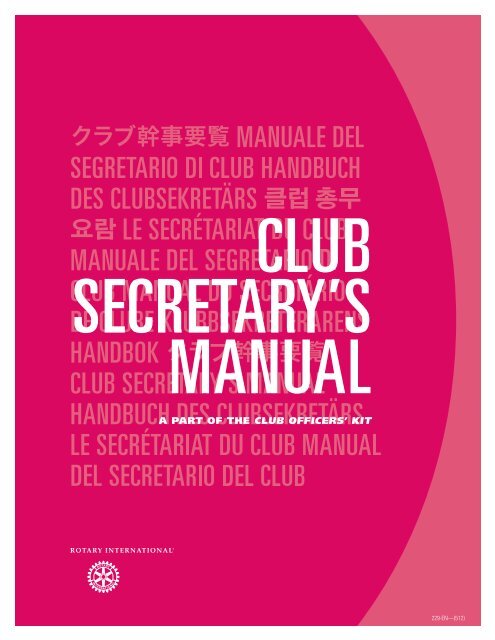
![La présidence du club [222-FR] - Rotary International](https://img.yumpu.com/25855726/1/190x245/la-presidence-du-club-222-fr-rotary-international.jpg?quality=85)

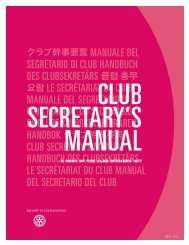




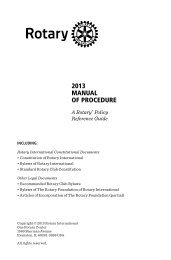



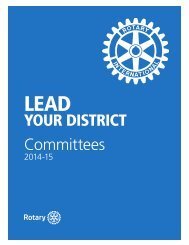
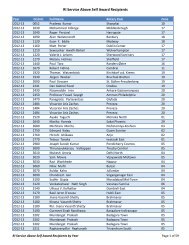
![La conférence de district [800-FR] - Rotary International](https://img.yumpu.com/25855636/1/190x245/la-conference-de-district-800-fr-rotary-international.jpg?quality=85)
